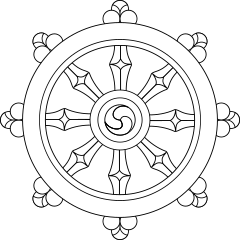Rohatsu
| Bodhi Day | |
|---|---|
 |
|
| Official name | Bodhi Day Rōhatsu (臘八) Shaka-Jōdō-e (釈迦成道会) Jōdō-e (成道会) |
| Observed by | Mahayana Buddhists |
| Type | Buddhist |
| Significance | The enlightenment of Gautama Buddha |
| Date | The 8th day of the 12th lunar month of the Chinese calendar, or December 8 in Japan |
| Frequency | annual |
| Related to |
Laba Festival (in China) (in Japan) Other related festivals Vesak (in Sri Lanka, Myanmar, Thailand, Cambodia, Laos) |
Bodhi Day is the Buddhist holiday that commemorates the day that the historical Buddha, Siddhartha Gautama (Shakyamuni), experienced enlightenment, also known as bodhi in Sanskrit and Pali. According to tradition, Siddhartha had recently forsaken years of extreme ascetic practices and resolved to sit under a peepal tree and simply meditate until he found the root of suffering, and how to liberate oneself from it.
Traditions vary on what happened. Some say Siddhartha made a great vow to Nirvana and Earth to find the root of suffering, or die trying. In other traditions, while meditating he was harassed and tempted by the god Mara (literally, "Destroyer" in Sanskrit), demon of illusion. Other traditions simply state that he entered deeper and deeper states of meditation, confronting the nature of the self.
In the Pali Canon, there are several discourses said to be by Buddha himself, relating to this story. In The Longer Discourse to Saccaka (MN 36), the Buddha describes his Enlightenment in three stages:
In his words:
All traditions agree that as the morning star rose in the sky in the early morning, the third watch of the night, Siddhartha finally found the answers he sought and became Enlightened, and experienced Nirvana. Having done so, Siddhartha now became a Buddha or "Awakened One".
The enlightenment of the Buddha is yearly celebrated in many Buddhist countries.
Bodhi Day is observed in many mainstream Mahayana traditions including the traditional Zen and Pureland Buddhist schools of China, Korea, Japan, and Vietnam. In Japanese Zen, it is also known as Rohatsu. In Tendai and other Japanese sects, it is called either Shaka-Jōdō-e (釈迦成道会) or simply Jōdō-e (成道会).
Services and traditions vary amongst Buddhist sects, but all such services commemorate the Buddha's achievement of Nirvana, and what this means for Buddhism today. Individuals may choose to commemorate the event through additional meditation, study of the Dharma, chanting of Buddhist texts (sutras), or performing kind acts towards other beings. Some Buddhists celebrate with a traditional meal of tea, cake, and readings.
...
Wikipedia
